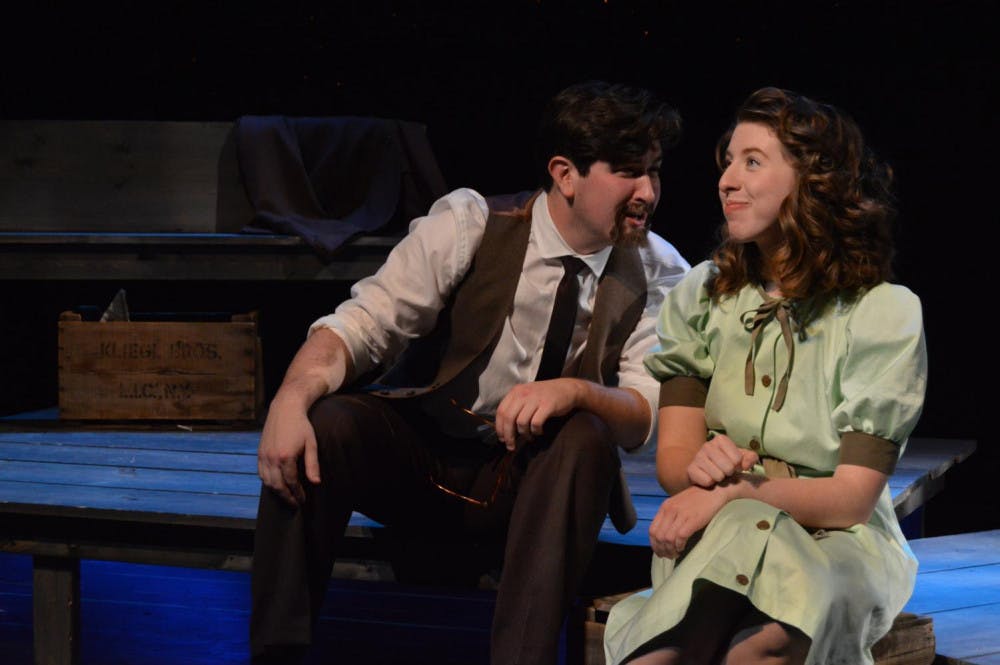Just before the doors of the Hepburn Zoo closed, a well-dressed and jovial man strode onto the stage to greet the audience. The man — Matt Friedman, played by August Rosenthal ’17 — pointed out the exits and informed us that the show would run for precisely 97 minutes. He went on to introduce us to the scene: a boathouse sitting on the shore of a glistening river, set against the background of twinkling starlight. When a few stragglers joined the audience, he decided to run through his entire monologue again for their benefit — this time at breakneck speed — before he was interrupted by an off-stage shout.
So began Talley’s Folly. The Pulitzer-prize winning play by Lanford Wilson ran from Dec. 1-3 in the Hepburn Zoo. The play, directed by Katie Mayopoulos ’18, served as the senior thesis work of Lana Meyer ’17, who produced the show and portrayed the titular Sally Talley.
The show takes place on the Fourth of July in 1944 Lebanon, Missouri, and chronicles in real time a conversation between Sally Talley, the liberal-minded daughter of a wealthy factory owner, and Matt Friedman, an accountant working in St. Louis. It quickly becomes apparent that Matt has come to ask Sally to marry him, but all of his attempts to express his intentions are met with Sally’s closed and protective dismissals. Over the course of the 97 minutes, however, the audience becomes privy to the secrets guarded by both characters and the undeniable love they share for each other.
With only two characters, one act and zero set changes, Talley’s Folly runs the risk of being too confined — but it is anything but. It is a decidedly tender story about family, war, nationality, differences, understanding, secrets and — ultimately and most importantly — love. Matt and Sally’s conversation is dynamic, entertaining and endearing as the pair divulges their tragic pasts and looming fears about their futures.
“A lot of student theater work in recent years has been drawn towards edgier subject matter, which I have always admired but is just not in my wheelhouse as a performer,” Meyer said. “While Talley’s Folly is not necessarily a traditional romance, it does have a marked ‘feel-good’ quality, the value of which I was hoping to bring into the canon of student work at Middlebury. In that context, this somewhat old-fashioned play feels, in a way, very new to me.”
The untraditional aspect to which she is referring comes not only in the unconventionality of the two lovers’ relationship, but also in the way they suppress the feelings they have for each other. Matt and Sally often comment on the unlikeliness of their attraction: Matt, a “probable” (as he put it) Lithuanian Jewish immigrant, is eleven years older than Sally, who grew up in a wealthy and conservative Protestant household.
Their differences, however, cannot outstrip the love they harbor for each other, and they ultimately find hope and acceptance in their relationship.
“Sally and Matt are not just unprepared for love,” Meyer wrote in her producer’s note, “they are afflicted with a loneliness they had come to believe would never end.”
But the loneliness does end. Both characters share a wit, lucidity and likeability that makes the show enticing and affecting. It was their vulnerability and honest portrayal by Meyer and Rosenthal that made the story and its message of hope and love so memorable.
Talley’s Folly Considers Love and Fear

WENDY WALCOFF
August Rosenthal ’17 and Lana Meyer ’17 play endearing characters in Talley’s Folly.
August Rosenthal ’17 and Lana Meyer ’17 play endearing characters in Talley’s Folly.
Comments



